1973 - Game 7: New York Mets @ Oakland Athletics
|
|
A major change came to MLB when the American League owners voted to adopt the Designated Hitter for the 1973 season.
- The move pleased Oakland owner Charlie Finley immensely since he had pushed for it. He argued that another hitter in the lineup would add the extra offensive punch needed to draw more fans.
- The rule was adopted on an experimental basis for three years.
Even a World Series championship could not end the turmoil on the Oakland A's, with their owner in the center of it.
- On November 30, Finley traded 1B Mike Epstein to the Texas Rangers for P Horacio Pina. Since Epstein had been at odds with manager Dick Williams throughout the '72 season, this was a question of addition by subtraction. The owner insisted the trade was made to allow Gene Tenace, the hero of the '72 World Series, to move to 1B.
Charlie claimed Tenace had injured his shoulder and couldn't throw well, making him a liability behind the plate. However, the injury was news to Tenace as well as the team doctor.
- C Dave Duncan was another malcontent, holding out during the spring in hopes of either being traded or obtaining a better contract. Finley responded by sending Duncan along with OF George Hendrick to the Indians for C Ray Fosse.
Fosse had ranked as the most promising young C in the league, excellent defensively and a strong hitter, until Pete Rose broke Fosse's shoulder by smashing into him to score a run in the 1970 All-Star Game. Although the break had healed, Ray's hitting was permanently affected.
- Finley also improved the club by acquiring speedy CF Billy North from the Cubs for journeyman P Bob Locker. North provided a serious upgrade offensively and defensively over Angel Mangual in the middle of the OF, allowing Reggie Jackson to move to RF.
- Ironically, the A's roster didn't include a player who could fill the role of DH. In fact, Charlie had traded Orlando Cepeda to the Red Sox to rid himself of the veteran's $90,000 salary. The former Cardinal would hit. 289 and drive in 86 runs as Boston's DH in 1973.
- But Charlie plugged the hole by obtaining 1B Deron Johnson. The 34year-old produced 19 HRs and chased home 81 in 131 games, 107 of them as the DH.
Pennant Races
Oakland started slowly.
- The A's lingered around the .500 mark until mid-June when they developed some momentum.
- On June 13, they sat at 30-29 in 4th place in the West. A month later, they were 51-39 and leading the division by 3.5 games.
- They briefly fell behind the Royals in early August before regaining the top spot August 16 and never looking back.
- Oakland won the division by six games over Kansas City.
As in 1972, the Athletics ranked high in both batting and pitching.
- Williams' club led the AL in runs (758, three more than KC and four more than Baltimore).
- They finished second in ERA at 3.29, behind only Baltimore.
- Catfish Hunter won 20+ for the third straight year. Southpaw Ken Holtzman tied Hunter with 21 wins, and another lefty, Vida Blue, contributed 20 more.
The ALCS pitted Earl Weaver's Orioles against the defending champion A's.
- The evenly-matched clubs split the first two games in Baltimore, then split the next two in California.
- So it all came down to Game 5 in Oakland. Catfish Hunter, who had won Game 2 6-3 with relief help, threw a clutch five-hit shutout for his 23rd victory to propel the A's into their second straight Fall Classic.
Williams recalled the locker room celebration after another tumultuous year for the A's. It's a wonderful feeling, a pennant, but this time I was so exhausted that I could barely lift the bottle of champagne over my head. All I could think about was that I wanted to win a second World Series title but without all the accompanying circus.
While the Junior Circuit went as expected, the NL produced a surprise winner.
- The Mets felt they had a team that was better than the "miracle" 1969 team. The pitching staff, led by Tom Seaver, could stand against any in baseball.
- But injuries plagued Yogi Berra's team from the start. C Jerry Grote played only 84 games because of a fracturerd wrist on his throwing hand while LF Cleon Jones appeared in just 92 and CF Don Hahn in 93. SS Bud Harrelson suffered not one but two fractures that put him on the disabled list.
- As a result, New York spent July and the first week of August in last place in the NL East.
- Fortunately, no one else took control of the division. Heading into September, NY had "risen" to 5th place but were only 4.5 games behind co-leaders St. Louis and Pittsburgh.
- The Mets went 19-8 the rest of the season, jumping from 4th to 1st in three days (September 18-21) during a seven-game winning streak. Down the stretch, reliever Tug McGraw coined the phrase "You gotta believe!" but, more importantly, backed up his words with 10 saves in September, including three the final week.
The race went down to the wire and actually beyond.
- The schedule called for New York to finish with a four-game series in Chicago. But rain washed out the Friday and Saturday games, forcing the scheduling of back-to-back doubleheaders Sunday and Monday.
- One scenario had five teams tying for the division lead at 60-62, which would have been fascinating but didn't happen.
- The Cubs won the first game on Sunday but lost the second and were eliminated. That left the Mets a game ahead of 81-81 St. Louis, which had completed its schedule, and 1.5 in front of Pittsburgh, which had one rainout to play.
- So two games were played on Monday. Pittsburgh lost to San Diego and were eliminated.
- All the Mets had to do was win one game of the DH. They took care of business in the 11 AM opener 6-4 to render the second game unnecessary.
- New York's 82-79 (.509) record remains the worst in history for a division winner in either league.
Meanwhile, four NL West teams won 82 or more games, led by the Reds with 99 victories.
Reggie Jackson, who missed the 1972 Series with a pulled hamstring, would play, but Billy North would not.
- The CF had sprained his ankle late in the regular season.
Finley reacted to the injury in typical fashion, as North recalled. I have a picture in my office of me sitting between Charlie Finley and Dick Williams as Finley told me I wouldn't even be able to sit on the bench for the Series. Teams do that all the time for injured players, and I'd had a pretty good season. I'd led the league in stolen bases and runs scored until I was hurt.
- Since baseball rules allowed only players on the roster on August 31 to be eligible for postseason play, the A's were down to only 23 eligible bodies after Finley sold reserve C Jose Morales to Montreal September 18.
- The A's petitioned to add two players to their roster for the ALCS, infielder Manny Trillo and designated runner Allen Lewis, and Baltimore agreed. However, the Mets approved only Lewis (since nobody but Finley thought he did the team any good).
Before Game One in Oakland, Finley ordered his PA announcer to tell the fans during player introductions that the Mets had refused to allow Trillo to play. Commissioner Bowie Kuhn issued a statement reprimanding Finley.
- Oakland would have to make a major adjustment for the Series since the DH was not allowed. So their pitchers would bat for the first time in a year. To get ready, they started taking batting practice two weeks before the playoffs.
Not surprisingly given the regular season records of the two teams, the A's rated 13-10 favorites to cop their second straight World Series.
Series Results
- Saturday, October 13 @ Oakland: Athletics 3 Mets 1
WP: Ken Holtzman; LP: Jon Matlack
- Sunday, October 14 @ Oakland: Mets 10 Athletics 7
WP: Tug McGraw; LP: Rollie Fingers
- Tuesday, October 16 @ New York: Athletics 3 Mets 2
WP: Paul Lindblad; LP: Harry Parker
- Wednesday, October 17 @ New York: Mets 6 Athletics 1
WP: Matlack; LP: Holtzman
- Thursday, October 18 @ New York: Mets 2 Athletics 0
WP: Jerry Koosman; LP: Vida Blue
- Saturday, October 20 @ Oakland: Athletics 3 Mets 1
WP: Catfish Hunter; LP: Tom Seaver
The most exciting game of the Series was the second, a 10-7 Met victory in 12 innings that is remembered because of an individual on each team.
The New York player was 42-year-old Willie Mays, who had announced his retirement after the season.
- Willie entered as a pinch-runner for Rusty Staub in the top of the 9th, then took over in CF for the bottom of the inning, Don Hahn moving to RF.
- But Willie proved he was a shadow of his former self, misplaying Deron Johnson's liner for a double that started the tying two-run rally.
- Mays later let another ball drop in front of him that he would have put in his back pocket a few years earlier.
- But in the 12th, facing Oakland relief ace Rollie Fingers, the future Hall of Famer got around on a fastball enough to ground a single into CF that drove in the go-ahead run.
The A's player who reluctantly wound up in the spotlight was Mike Andrews.
- Like Willie, Andrews didn't start the game. He entered in the 8th as a PH for 2B Ted Kubiak. Injured most of the season, Andrews had started only 15 games, being used mostly as a DH.
- Not prepared to play in the field, Mike had no challenges until the top of the 12th. After Mays' single, he let a grounder that should have been the third out go through his legs. That allowed two insurance runs to score.
- To make matters worse, Andrews fielded the next hitter's ground ball but threw wildly to let in the 4th tally of the inning.
- His plight would have been bad enough without his owner making him a cause celebre after the game. Finley had the team physician examine Andrews in the dressing room and issue a statement that Mike Andrews is unable to play his position because of a bicep groove tencosynotitis of the right shoulder. It is my opinion that he is disabled for the rest of the year. Andrews was forced to sign the report under the words, I agree to the above.
Finley would later claim that Andrews signed the statement in exchange for a guaranteed 1974 contract. But that made no sense since Mike had already let his teammates know that he was retiring after the season. Andrews told UPI that Finley had threatened to destroy me in baseball if he didn't sign the statement.
- The objective behind the sham medical report was to get the Commissioner to approve Manny Trillo as the replacement for Andrews for the rest of the Series. But, after meeting with Mike, Kuhn reinstated him and issued this statement: I might add that the handling of this matter by the Oakland club has had the unfortunate effect of unfairly embarrassing a player who has given many years of able service to professional baseball.
On the trip to New York for Game 3, the A's discussed various ways to show their solidarity with their teammate. At practice the next day, they wore black patches with Andrews' number, 17, on their sleeves. Reggie Jackson hinted that the team might boycott the game. Ken Holtzman later confirmed that. We had voted on the plane to boycott if Andrews wasn't reinstated. And you know that bunch, they would have done it. Joe Rudi: We weren't going to let Finley get away with making Andrews the scapegoat. Fortunately, Kuhn's ruling obviated the plan.
However, Williams shocked his club with an announcement the night before Game 3. Hunter recalled the team meeting: "I won't be with you guys next year," he said. Mouths dropped open all around the room. What the hell was this? In the middle of the World Series? "It's not because of the team. Not you guys. It's between me and Charlie. I can't put up with this shit anymore. We're doing everything we can to win, and he's doing everything he can to keep us from winning. So win or lose, it doesn't matter to me. I'm out of here. I'm gone.
Read the story of Game 3 from the Golden Archives.
The Mets shocked the world by taking a 3-2 lead in games.
- Berra made a widely debated decision to send Seaver to the mound for Game 6 on three days rest rather than holding his ace for Game 7.
- Three days rest or four, NY fans felt confident with Tom Terrific on the bump, but Hunter outpitched him to set up Game Seven.
- That set up the third confrontation between southpaws John Matlack of the Mets and Oakland's Ken Holtzman. Holtzman had won Game 1, but Matlack turned the tables in Game 4. Since Kenny had not lasted the 1st inning in Game 4 while John threw eight that day, the A's hoped their southpaw would be stronger.
- Amazingly, the A's had yet to hit a home run in six Series games. Would the law of averages catch up with the outstanding Mets' pitching staff in Game 7?
- Captain Sal Bando mimicked the NY rallying cry. You gotta believe ... in the law of averages! Jon Matlack is due to give up a few runs. [The Mets hurler had yet to allow an earned run in the Series.] Kenny Holtzman is due to pitch a great game. And we're due to finally hit a home run.
- Reggie Jackson was not as optimistic, calling Matlack a "left-handed Tom Seaver."
- Looking for more punch in his lineup, Williams had started Johnson at 1B and Tenace behind the plate in Game 6. He would use that same combo in the ultimate contest.
- Berra considered it inevitable that the Series went seven games. We haven't had anything easy all year. Yogi was glad he had Matlack for the final contest. Down the stretch, he's been my best pitcher.
- The 23-year-old southpaw looked forward to his assignment. I'd be stronger with the extra day's rest. It'll be strictly physical. If I have my good stuff, I'll get them out. If not, they'll get me out.
New York Lineup
| Wayne Garrett |
3B |
| Felix Millan |
2B |
| Rusty Staub |
RF |
| Cleon Jones |
LF |
| John Milner |
1B |
| Jerry Grote |
C |
| Don Hahn |
CF |
| Bud Harrelson |
SS |
| Jon Matlack |
P |
|
 |
 |
Oakland Lineup
| Bert Campaneris |
SS |
| Joe Rudi |
LF |
| Sal Bando |
3B |
| Reggie Jackson |
CF |
| Gene Tenace |
C |
| Jesus Alou |
RF |
| Deron Johnson |
1B |
| Dick Green |
2B |
| Ken Holtzman |
P |
|
|
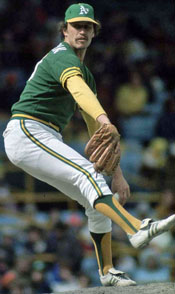
Ken Holtzman
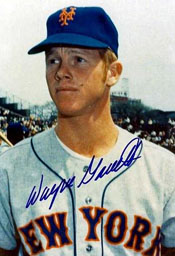
Wayne Garrett
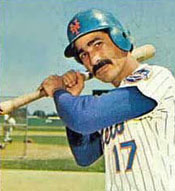
Felix Millan
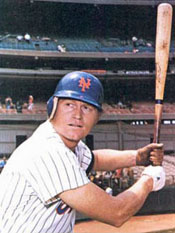
New Orleanian Rusty Staub
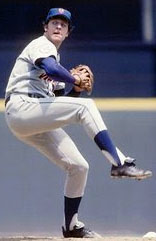
Jon Matlack
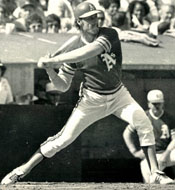
Joe Rudi
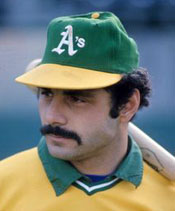
Sal Bando
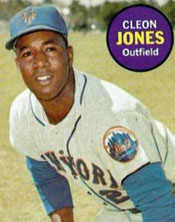
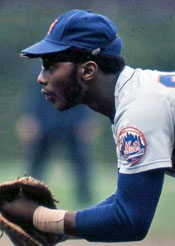
John Milner
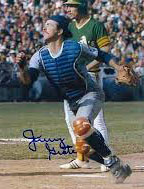
Jerry Grote
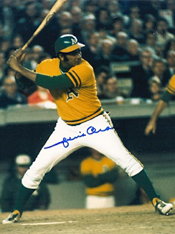
Jesus Alou
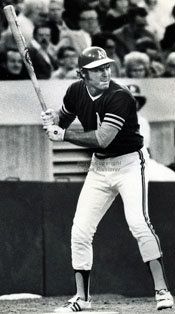
Deron Johnson
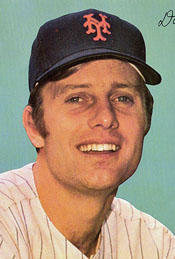
Don Hahn
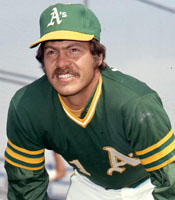
Dick Green
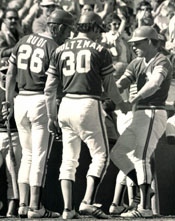
Campaneris arrives home after his go-ahead HR.
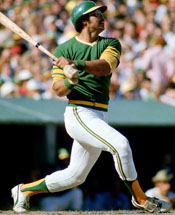
Reggie Jackson clouts a HR.
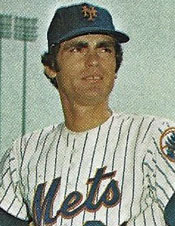
Harry Parker
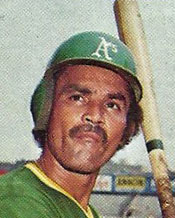
Vic Davalillo
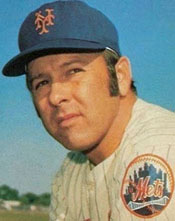
Jim Beauchamp
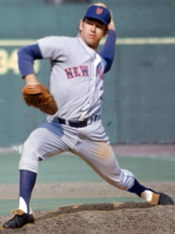
Ray Sadecki
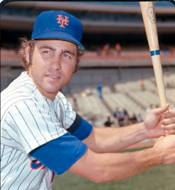
Ken Boswell
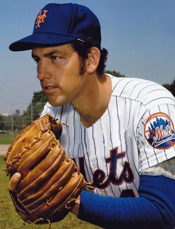
George Stone
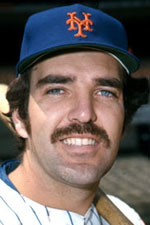
Ed Kranepool
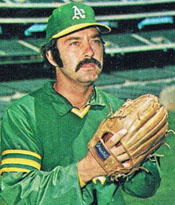
Darrell Knowles
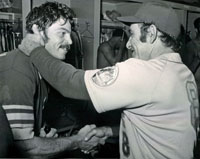
Berra congratulates Green.
|
Game 7: Sunday, October 21 @ Oakland-Alameda County Coliseum
- Monte Moore of the A's, Curt Gowdy, and Tony Kubek provided the commentary for NBC's telecast of the game.
- The weather produced a bright, warm day with a gusty wind that would give trouble of popups.
- 49,333, the fourth crowd of more than 46,000 in the games at Oakland, settled into their seats.
1st inning
- Wayne Garrett took a Holtzman's curve for strike three to start the game.
Choking up as much as any hitter, Felix Millan (5-for-28) rolled out, SS Campaneris to 1B Johnson.
Rusty Staub (9-for-22) hit the first pitch, a curve, to Jackson in LCF.
- Bert Campaneris grounded to 3B Garrett.
Matlack, throwing more curves to start the contest than he did the other other Series starts, walked Joe Rudi on four pitches.
Sal Bando, whose hot bat carried the A's the last three weeks of the regular season, struck out on a fastball.
Reggie Jackson had eight hits in the Series but four came in the second game and three in Game 6. He rolled the first delivery to 3B.
Matlack after the game: Warming up before the game, I was satisfied that I had decent stuff. I had a good curveball. I tried to build the game around the curveball. But when the game started, I'd throw a couple good ones and then a bad one. I don't know why. But that happens out there.
2nd inning
- As NBC played a tape of Holtzman talking about how tough Cleon Jones had been on him, the Mets CF flied out deep to his counterpart, Jackson, just short of the warning track.
John Milner (8-for-24) popped to 2B Dick Green in short RF.
Jerry Grote smashed a liner to CF that Jackson dove and caught just off the grass.
- The '72 World Series MVP Gene Tenace (3-for-16 but with a record-tying 10 walks in the six games) took a called third strike.
Jesus Alou, the third of the brothers to play with the A's after being picked up from Houston late in the season, fouled out to 1B Milner in the wide expanse in front of the Mets' dugout.
Garrett scooped Deron Johnson's grounder on the short hop and threw the big 1B out at 1st.
3rd inning
- Don Hahn, from nearby Campbell CA, hit a sinking liner that dropped in front of LF Rudi.
Bud Harrelson showed no indication of bunting as he swung through the first two pitches. The Holtzman threw three wide ones, his fast ball moving out of the strike zone. Then Bud lined to Rudi, who fought the sun and wind to grab the ball over his head.
Matlack, who finished in the top ten in the NL in sacrifices, bunted too hard to Bando, who started a 5-6-4 DP.
- Dick Green (1-for-12 after hitting .260 during the season) took a bender for strike three.
Holtzman, a right-handed batter, drilled a liner into the LF corner for the Athletics' first hit. It was Ken's second double of the Series and the third for the Oakland pitchers, who outhit the Mets staff.
Matlack after the game: On the 0-2 pitch to Holtzman, I threw a fastball in. He looked for the ball, and he swung the bat. He likes the way I throw.
Campaneris delivered Oakland's first HR of the series, smashing a hanging curve over the RF wall with the aid of the wind. The slim SS had also hit two roundtrippers during the ALCS. The pattern was now complete of the home team scoring first in every one of the seven games.
Matlack: Campaneris hit a good pitch, a curveball away. He'd been taking a big cut on curveballs away and missing the whole series. That's why I threw it. But he didn't miss this one.
Rudi smashed another hanging curve into LCF for a single. That put Harry Parker to work in the NY bullpen as pitching coach Rube Walker visited the mound.
Bando popped to Milner.
That gave the Mets a good chance to get out of the inning without further damage since Jackson, the next man up, had managed only a single and a walk in eight plate appearances against Matlock.
But Reggie tatooed a hanging curve over the RCF wall. When he was one stride from home plate after rounding the bases, he jumped and landed with both feet to put an exclamation mark on his homer. After the A's had gone the first 59 innings of the series without a big fly, they had popped two in one frame.
Matlack: Jackson hit a hanging curveball - a bad spot, a bad spitch. It didn't do a thing.
Berra brought in Parker, who walked Tenace. That tied Babe Ruth's record of 11 walks in the 1926 Fall Classic.
Matlack: The first two innings, I was getting away with mistakes, but in the third, they didn't miss any mistakes.
Lefthanded hitting Vic Davalillo pinch-hit for Alou as Ray Sadecki warmed up for NY. Vic popped out to CF Hahn.
A's 4 Mets 0
4th inning
- Davalillo played CF as Jackson moved to RF, where he received a standing ovation from Reggie's Regiment in the bleachers.
Garrett flew out to CF.
Millan poked the first pitch into the RF corner, and Jackson, playing shallow and near the line, ran into foul territory and grabbed the ball just before running into the wall.
Staub, having a fine series despite a bad shoulder, lined a single past SS to take the lead in the Series with ten hits.
Jones walked on a 3-2 pitch.
Williams trotted to the mound as righty Rollie Fingers and lefty Darrell Knowles jumped up in the pen.
Milner, NY's leading HR hitter, hit a hot shot to Green, who flipped to 1st.
- Parker caught Johnson looking.
Green went out 5-3.
Holtzman, whose double started the 4-run rally, popped to Harrelson in foul territory down the LF line.
5th inning
6th inning
- The Mets finally got to Holtzman.
Garrett whiffed on a fast ball.
But the light-hitting Millan drove a liner to the LCF fence for a double.
That brought up the Fingers-Knowles combo again.
Staub followed with another double to the RCF wall.
Williams summoned Fingers, who made his 12th relief appearance in two Series. The change also meant that, for the second year in a row, there were no complete games in the Fall Classic.
Jones flew to Jackson in deep RF, Staub taking 3rd.
Rollie fell behind Milner 2-0 before inducing a grounder to 1st.
A's 5 Mets 1
- Sadecki mowed down the 6-7-8 hitters.
Davilillo skied to short RF.
Johnson whiffed again.
Green bounced to SS.
7th inning
- Ray Fosse took over behind the plate with Tenace moving to 1st.
Fingers had a reputation of just trying to get the ball over the plate when protecting a big lead. That approach nearly cost the A's in this inning.
Grote smashed the first pitch straight to Rudi.
Hahn worked the count to 2-2 before lining a single to RF. The Mets now tied the A's with six hits.
Harrelson flew to Davalillo in LCF.
Already 2-for-2 as a pinch hitter, Ken Boswell, batting for Sadecki, tied a World Series with his third pinch hit, a single to CF to send Hahn to 2nd.
Knowles heated up quickly for the A's as pitching coach Wes Stock talked to Fingers.
With the runners on the move on a 3-2 pitch, Fingers got the benefit of a questionable call from Marty Springstead behind the plate as Garrett protested heatedly. And no wonder - his 11th K tied the Series record set by Eddie Mathews in 1958.
- Lefty George Stone, 12-3 as a spot starter during the season, gave up a bloop single into RF to Fingers.
Campaneris dropped a bunt down the 1B line and beat it out when Milner couldn't get the ball out of his glove. The scorer ruled it a hit, vaulting Campy into a tie with Rudi and Jackson for most hits for the A's with nine.
Jerry Koosman warmed up as Rudi stepped into the batter's box. But Stone wiggled out of trouble by fanning three tough hitters: Rudi, Bando, and Jackson.
8th inning
- Fingers set down the 2-3-4 batters with ease.
Millan and Staub grounded out to SS and 2B respectively, and Jones, unable to put much weight on his ankle, went down swinging.
- Stone completed his second scoreless inning of the game and third of the Series.
Tenace flied to LF.
Davalillo rapped a grounder to 2nd.
Up for the first time, Fosse swatted the first offering into LF.
But the single was wasted when Harrelson threw out Green.
9th inning
- Did the Mets have one more miracle up their sleeves?
Fingers did the last thing he wanted when he walked Milner on a 3-2 pitch after John fouled off five two-strike pitches.
Bando told Fingers between Milner's fouls: I hope this guy hits a fair ball. I'm getting tired being out here.
Grote again put good wood on the ball but flew to LF.
Hahn singled to RF, Milner stopping at 2nd.
Berra had McGraw warming up in hopes he would be needed for the bottom of the 9th.
Fingers fielded Harrelson's grounder and threw to 1st, the runners advancing.
Ed Kranepool hit for Stone and bounced to Tenace for what should have been the last out. But the ball took a bad hop. Gene dropped the ball, then couldn't pick it up cleanly as Milner scored.
Assuming the game would be over, several dozen youngsters spilled out of the stands and swarmed heroes like Jackson.
Williams: While we held a 5-2 lead with two out in the ninth, a fan jumped over the RF fence and stole Reggie's hat. Reggie threw down his glove and chased him, and just as he was about to catch him, another fan leaped down to steal his glove. After he recovered his equipment and took his position, I thought, How typical - just as everything seems to be falling apart, this crazy ball club puts it back together.
During the time it took to clear the field, Williams made what would turn out to be his last move as Oakland manager. With the tying run at the plate, he brought in Knowles to pitch to Garrett, lefty vs. lefty. Ted Martinez took Kranepool's place at 1st.
Fingers: I still had good stuff in the ninth, but I'd lost about a yard off my fast ball.
Knowles: I'm going to kill Gene Tenace for making that error. I didn't want to come in at all. My knees were shaking in the bullpen as it was.
Completing his unique feat of pitching in all seven games, Darrell got the save when he jammed Wayne with a 1-0 fastball, and the ball flared toward short LF. Campaneris ran back and snatched it out of the air to make Oakland the first back-to-back champions since the 1961-62 Yankees.
FINAL: A'S 5 METS 2
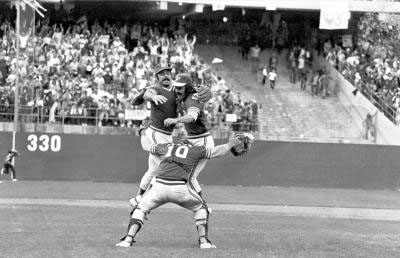 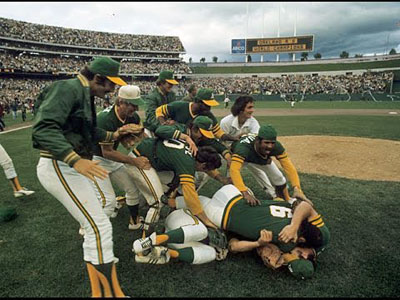
Athletics mob Darrell Knowles after final out.
Williams: These long-haired, freaked-out, swinging, fighting, fantastic A's were better than anybody, maybe at any time. It was a dynasty. I was a miracle. And I couldn't enjoy it. Just as the last out was made, it sunk in that no matter what I'd done, this wasn't my team, not really. The fact that I could leave them proved it. This was Charlie's team. And this World Series win, which we envisioned as showing Charlie up, only made him happier. I realized this as Campaneris made his catch, and so I did something that I sometimes regret. I didn't celebrate on the field. I clapped a couple of times, turned, and headed down the runway into the clubhouse. This was Charlie's team out there now. I was finished. And I wanted to get the hell out before I did something I'd really regret, like decide to stay.
Thousands of fans charged out of the stands and left the Coliseum a shambles.
- Gone were the bases. The mound was flattened. The field was littered with debris. The dugouts resembled a junk yard.
- Holtzman suffered a cut nose. I had to fight for my life. Four guys jumped me as I came off the field. One of them popped me on the nose. I swung back. I think I cooled him. So, along with my double, credit me with two hits for the day.
- The Coliseum workers began tearing down the outfield fences to change the stadium into football configuration.
Future Hall of Famers in the 1972 World Series
Athletics: Manager Dick Williams, Rollie Fingers, Catfish Hunter, Reggie Jackson
Mets: Manager Yogi Berra, Willie Mays, Tom Seaver
Postgame
A's Clubhouse
- Confirming rumors that had swirled throughout the Series, Williams announced his resignation as Oakland manager. There is no way I can describe the thrill of winning my second World Series. But in my heart, it is a sad thing for me. I am leaving for personal reasons and not out of any dissatisfaction over my relations with Mr. Finley. He has been wonderful to me. I have nothing but the highest regard for him. Addressing the speculation that he was headed to the Big Apple, where Ralph Houk had resigned after 11 seasons to take over the Tigers, Dick said: Honestly, I have not talked to the Yankees, and they have not talked to me. But I would love to manage for the Yankees. A man would have to be out of his mind not to want to be with that team. Williams said he made his decision to leave the A's in mid-season and broke the news to his eam in a secret meeting before Game 3 of the Series. He said Finley had urged him to stay. You can expect Finley to do something dramatic. He likes to play games. I wouldn't be surprised if he named the first black manager in the major leagues.
- The Series MVP, Jackson, threw his arm around Williams as they faced TV cameras. I'm sorry, I'm sorry. I hate to see him go, but I understand. Reggie credited Williams for teaching me how to win. He went on: Dick had to leave now. He's tired of what has been going on, but you can only stand so much. He's a proud man, a powerful man. He doesn't need to take anything from anybody. But this is a golden opportunity for him to get out of it, and that's why he's leaving. When a reporter suggested that Finley deserved some of the credit for the second successive championship, Jackson disagreed. Please don't give that man the credit. That takes away from what the guys have done. It would have been the easiest thing in the world for this team to be down because of that man. Our fans helped us here. They knew we were better, and they knew why.
Reggie added his own story to the bizarre scene in the winning clubhouse - a death threat. A couple of weeks ago, I got a call from Mr. Finley to hustle over to the ball park for a meeting. It was a day off, and I had been looking forward to spending the day at home resting, but I sensed an urgency in Mr. Finley's voice. So I went to his office in the Oakland Coliseum. When I got there, there were three FBI men in attendance, and they had a letter they wanted to show me. The general tone of the letter was a threat on my life. It said that, if I played in the American League playoffs, it would be the last thing I ever did. So, from that day on, including the final weeks of the season, the playoffs, and now the World Series, I had a couple of FBI men with me all the time. I didn't take the threat all that seriously, and I don't think it affected my play in any way, but still I had it on my mind. You don't dismiss anything that easily.
- Tenace on Jackson winning the MVP award that he had taken home in '72: We needed Reggie's spark. He's our big man. It was tough winning this one. It didn't seem like a World Series until the last few days. It was tough to concentrate on baseball. There were too many distractions. Then Dick Williams didn't help matters any when he told us in the middle of the World Series that he was quitting. I'm sure he wasn't thinking when he said it. The timing was bad. We were depressed enough with the Mike Andrews case and a few other things. I think if Williams had not told us his intentions, it might have been easier on us. ... They can't find another manager who can fill Dick Williams' shoes. It's not that the new man will have difficulty on the field. His problems will be off the field. We have 25 contrasting personalities on this club. The manager will have to be able to handle each one separately. This is a different team than any other in baseball. But we have great talent. And we have great pride. There's not a weakness in our lineup. Every department is solid. The only spot we'll have to fill is at second base. Dick Green is retiring to go into the trucking business. I'm sure we'll be in the World Series next year. And the year after. We have a dynasty here. Now if we can only find the right manager to keep things in order.
- Catfish Hunter also spoke out against his owner. It's the worst mistake Charlie Finley ever made. He created an atmosphere that drove the best manager in baseball away from a championship team.
- Joe Rudi disclosed that he had twice asked Williams if there was anything the team could do to keep him in Oakland. I would give anything in the world to keep him with us. But he said no, there was no way.
- Finley said he had a replacement for Williams in mind. I cannot mention his name at the moment. I'm not going to be in haste to make a decision. There are at least seven former managers who've contacted me the last few days to indicate their interest. He wouldn't rule out hiring the first black manager in the major leagues. The job is wide open.
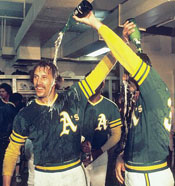
Holtzman enjoys champagne bath. |
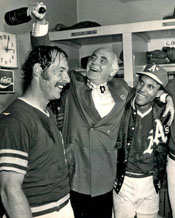
Campaneris watches Finley douse Tenace. |
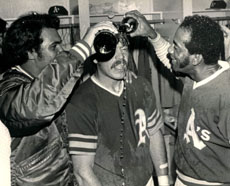
Green gets double dose.
|
Mets Clubhouse
- Berra: I told our players before the game that we had a great year and that I was proud of them, whether we won or lost. They did great for me. I got no complaints. The turning point came Saturday when we had the tying run at third and one out in the eighth. We should have won it right there. On Game 7: We got the kind of team that, when we're down 4-0, we're in trouble.
Yogi recalled his other World Series as manager - 1964 against the Cardinals. I had the tying run at the plate in the ninth inning of that seventh game, too.
The Mets skipper went to the A's dressing room to offer congratulations. He patted Jackson on the back. Nice game. Don't wear the glasses, he kidded. I need them, replied Reggie, laughing as he blinked his eyes.
- Staub explained his medical status. I tore the right shoulder. I didn't separate it, okay? I tore something in the joint, but I don't need an operation. Resting it should be enough. Then he talked about the season. It's really something to be proud of. For me personally, I'd never in my whole life been a part of anything like this. To be able to come back from last place in our division ..., then win the playoff and get to the seventh game. I'm really proud of what we did. We're down now because we lost. But when people realize how far we had to travel to get here, they'll be proud.
- Seaver: You can never feel bad about losing a World Series. If you told me two months ago that we'd even be in the World Series, I'd have told you that you were crazy. Tom added: Oakland is the best club we played all year.
- McGraw: I was believing up until the last out. It's just a bummer to lose. It's been a long year, and we came a long way. We just didn't take it all. But I don't think everything is wasted.
- Willie Mays, who was retiring at age 42: I don't think we have anything to be ashamed of. No, I'm not disappointed I didn't play. Just because it was my last game, it didn't make any difference to me if I played or not. If it was to help the ballclub, fine, but not because it was my last game. I don't think I'm very good at pinch hitting. These kids developed a lot of togetherness. When asked how it felt to take off the uniform for the last time, the future Hall of Famer said: I don't feel nothin', man. I probably won't feel nothin' until next spring training..
- A half hour after the game, several A's - Bando, Fosse, Rudi, and Knowles - came to the Mets' clubhouse and shook hands. You guys are the best I've seen, said Bando.
The city of Oakland held a victory parade at 11 AM the next day.
The attendance totaled 358,289 (average of 51,184).
- Each winning player earned an extra $24,618.
- Every Met pocketed $14,950.
1973 World Champion Oakland Athletics
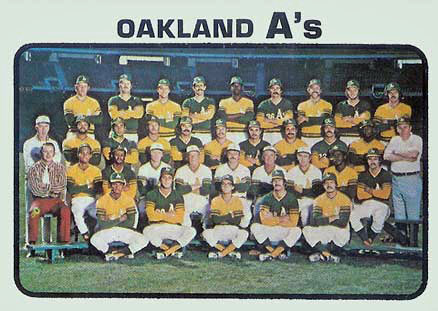
References: Catfish: My Life in Baseball, Jim "Catfish" Hunter with Armen Keteyian (1988)
The World Series, David S. Neft & Richard M. Cohen (1990)
Champions: The Story of the First Two Oakland A's Dynasties - and the Building of the Third, Glenn Dickey (2002)
The Seventh Game, Barry Levenson (2004)
|
|
|